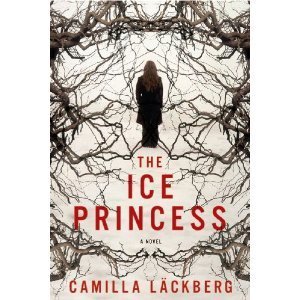Camilla Lackberg is the best selling Swedish author specializing in crime fiction. The specialty of her books are that all the books are in sequence. The characters develop over the years and over her books. Not all her books are available in English and even less in India at present, but hopefully that will change, for finally, after Agatha Christie, I find myself loving a series in this genre again!
How is this series different from most other Scandinavian crime writing? Say for eg, Stieg Larsson? Lackberg, like Christie, uses domestic settings for her crimes, friends and neighbours, local police, local detectives, the snoopy neighbour who provides clues. Even when she goes beyond the immediately domestic, say, in :The Hidden Child" where she deals with the Nazi threat on Sweden in the 1930-s and 40-s, it is still rooted in the characters surrounding the locality.The books available in India are- The Ice Princess, The Preacher, The Stone Cutter, The Stranger, The Hidden Child. (The Drowning has not yet come to India).
Though domestic details abound in her books and some of it is plain distracting from the main mystery, it is nice to see how the characters and the life stories develop over the books. However, it can be really a dampener when you are dying to know if your suspicions about the criminal is right. I confess I am guilty of skipping pages at a time while reading many of her books. Not quite the next Christie or the next Larsson, but definitely worth a read if you are a crime fan.
Her protagonist is Erica Falck and her partner Patrick Hedstrom who slowly takes over the action as the sequence progresses and Erica gets relegated to the background as his wife.
This is the first of the series and of course it is a joy to see how the events she has been talking about in her next books start off here. Erica's parents have just died in the accident and her mother is talked about, the mystery of her aloof motherhood is finally solved in "The Hidden Child" of course. She meets Patrik and by Hidden Child they have a one year old child and another on the way. Anna- Erica's sister, Dan, Mellberg, Annika, all these characters develop over the course of her series and it is wonderful to see how they were conceived. It good to see how well planned the series was, or did she just stumble upon ideas along the way. As I have said before, there is too much domestic detail in her books which can, frankly be skipped, and does not necessary increase the value of the mystery. But there are people who like the pictures of domesticity, for them, this is a double whammy. The mystery is well resolved in the end. Lackberg has often been compared to Steig Larsson, but I have felt that she is more akin to the style of Agatha Christie, the food-home-nosy neighbour troubles rather than politics and the outside world.
The Preacher, The Stone Cutter and The Stranger are all mysteries which break the peace of the quiet town again and again and Patrick manages to get to the bottom of every mystery. The Preacher deals with the murder of young girls both in the present day juxtaposed with many years back and that makes it interesting. But there is too much details about superfluous characters and the language seemed a little lost in translation. The Stone Cutter has a lot of issues like ADHD, Autism and child abuse/ pornography stuffed into it and is quite dark in its cruelty. The Stranger has a very scattered plot which does not quite make sense in the end.
Oh yes, after reading so many of her books at one go, this is the exact thing I was waiting for. Have Lackberg move out of her modern Fjallbacka and go back in time to a more interesting era, to some history, historical crime. In all her other books, I have skipped parts where she goes to much into domestic details or into the lives of characters quite unrelated to the mystery at hand. Anna, Erica's sister for example, is not important as part of her mysteries in any of her books till date, but her life is dealt with in great detail from her first book. In this too, her moving in with Dan and the troubles they have with their sets of kids, especially Dan's older daughter is not in any way connected to the main plot of the book. However one has to remember, she is writing a series where her characters develop over time. Just like her parents, especially her mothers lack of love towards the sisters, and its reason is finally dealt with in this book, who knows, one day, Anna may become one of the pivotal characters in her next mystery.
Also read my blog on gender issues in her books at http://spearheadintersearch.blogspot.in/2012/06/book-review-camilla-lackberg-study-of.html




